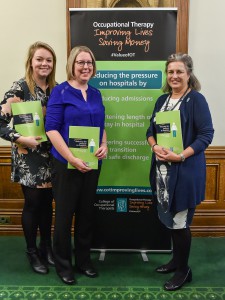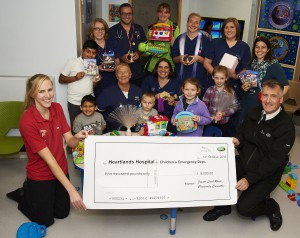Request for information about contracts for funerals.
Please see attached document FOI4874DisclosureDocument
- Total annual cost of private patient taxi services, excluding voluntary car services and patient transport services, e.g. ambulances for 2015/16 (the data that was previously gathered and published as part of ERIC returns: http://hefs.hscic.gov.uk/ERIC.asp)
T04.06: Patient taxi cost: Total annual cost of private patient taxi services, excluding voluntary car services and patient transport services, e.g. ambulances.
The total patient taxi cost in 2015/16 was £47,000 this relates directly to patient journeys.
 An innovative palliative therapy team run by Heart of England NHS Foundation Trust which utilises occupational therapists to help get patients home quicker, has been highlighted as an example of best practice in a major national report published this week
An innovative palliative therapy team run by Heart of England NHS Foundation Trust which utilises occupational therapists to help get patients home quicker, has been highlighted as an example of best practice in a major national report published this week
In the report, the College of Occupational Therapists highlights how occupational therapists can reduce hospital admissions and reduce discharge delays, cutting the time patients spend in hospital unnecessarily and saving valuable NHS resources.
The Macmillan Specialist Palliative Therapy team, which works across Heartlands, Good Hope and Solihull Hospitals, is highlighted as an example of best practice which could be adopted more widely.
The service was established two-and-a-half years ago and aims to facilitate the safe and timely discharge of patients to their preferred place of care, or indeed for terminal patients, their preferred place to die. It does this by establishing effective links with key stakeholders within the Trust and community settings such as hospices and community palliative care teams.
Occupational therapists support peoples’ ability to continue to take part in daily occupations and activities. They provide advice in falls prevention, arrange home adaptations and signpost patients to support services so they can manage once home.
Lucy Davies, occupational therapist in the Macmillan Specialist Palliative Therapy team at the Trust, said: “We were delighted to be asked to go down to Westminster with the College of Occupational Therapists and to be recognised for best practice. We strongly believe in what we do and the benefits it provides for our patients and the Trust.
“The patient and carer feedback we are receiving has been very encouraging and we are seeing what a positive impact our work can have on improving palliative care pathways, preventing avoidable admissions, reducing the length of inpatient stays and achieving preferred place of care at end of life.”
Julia Scott, chief executive at the College of Occupational Therapists, said: “The NHS is under considerable financial pressure. To make services sustainable in the long term it is vital that fewer people are admitted to hospital unnecessarily and those who are admitted stay no longer than they need to. I would encourage NHS Trusts and local authorities to look at valuable examples like this one that show how early intervention by occupational therapists can make a real difference to people’s lives whilst saving the NHS money.”
The College argues that a medical ‘fix’ is not enough for frail older people and that hospitals should follow the lead set by the Macmillan Specialist Palliative Therapy team of placing equal focus on patients’ needs for recovery and long term independence.
The Reducing the Pressure on Hospitals report from the College gives six key recommendations for change including the provision of occupational therapists in all rapid response and emergency care services, more occupational therapy within primary care to prevent frailty and falls-related hospital admissions and ‘out of hours’ service provision.
A catalogue of all records held of “never events” that occurred in Accident & Emergency departments within the Trust broken down by month since January 2013 including figures for the most recent month where statistics are available. Please provide the date of incidents, location of incident (hospital), a brief description and any investigation outcome known.
There have been no Never Events.
A catalogue of all records held of Serious Untoward Incidents or Serious Incidents Requiring Investigation that occurred in Accident & Emergency departments within the Trust broken down by month for each of the last 3 years since January 2013 including figures for the most recent month where statistics are available. Please provide the date of incidents, location of incident (hospital), a brief description and any investigation outcome known.
Please see attached spreadsheet FOIA 4843
I would like to request a departmental structure of the Clinical Governance/Compliance/Patient Safety/Risk/Investigations team(s).
Please see attached document FOI 4855
1. How many times has your organisation been a victim of a cyber attack in the last two years? Once– this did not result in a loss of data
2. How many times has your organisation been a victim of a ransomware attack in the last two years? Our mail filters regularly detect and block emails containing ransomware so whilst we have been targeted with ransomware, we have not been a victim of it.
In each case, was a ransom paid and if so how much was paid? Not applicable.
3. For each of the cyber and ransomware attacks, please provide a summary of the incident. This should including details of who was targeted, how they were targeted, what the immediate impact was, for instance was patient or staff data targeted, and if so in what way and how many people’s data was affected? For each of the attacks, please also detail whether the police became involved, and whether the perpetrator or perpetrators were caught?
This Trust like many organisations will be subject to virus, ransomware etc attacks on a daily basis however the majority of these attacks are detected and prevented by firewalls and AV solutions.
The instance referred to in Question 1 related to an instance where a USB device containing a virus was connected to the network which infected data within a windows file share in a particular department-this created disruption for the service until resolved. It is impossible to say who/ how data may have been affected as services use file shares for a number of purposes, however patient data would usually be held on clinical systems and not within file shares.
- Over the past five financial years (2011-12, 2012-13, 2013-14, 2014-15, 2015-16) please state the number of last minute elective surgery cancellations there have been for non-clinical reasons for the following branches of surgery: trauma and orthopaedics, neurology, cancer, neurosurgery and ophthalmology. Please break down by year and surgery type.
- Over the past five financial years (2011-12, 2012-13, 2013-14, 2014-15, 2015-16) please state how many patients were not treated within 28 days of last minute elective cancellation of an operation for the following branches of surgery: trauma and orthopaedics, neurology, cancer, neurosurgery and ophthalmology. Please break down by year and surgery type.
For clarification, “last minute” refers to on-the-day cancellations; the request for cancellations of cancer surgery could also be expressed as ‘cancellations for treatment of cancer’.
Please see attached spreadsheet FOI4870
 Young patients visiting the Children’s Emergency Department at Heartlands Hospital were delighted after receiving a bumper donation of toys to replace the thousands of pounds worth of toys and equipment that were damaged during the floods earlier this year.
Young patients visiting the Children’s Emergency Department at Heartlands Hospital were delighted after receiving a bumper donation of toys to replace the thousands of pounds worth of toys and equipment that were damaged during the floods earlier this year.
Staff in the Children’s Emergency Department were left dismayed to see sofas, tables and chairs, a soft play area, toys, games, zimmer frames, books and electrical equipment such as a TV, DVD player, iPads, monitors and game consoles all irreparably damaged after the flash floods in June.
The department remained closed for a number of weeks while repairs and redecoration took place and paediatric patients were treated in another part of the Emergency Department.
£5,000 was kindly donated by Jaguar Land Rover, the same amount was donated by the Trust, Asda Small Heath donated toys and the Birmingham Vineyard Church donated £500. Sue and Eliot Wright from Topsham in Devon, whose daughter Katie works as a consultant in ED, also donated £500.
Charlotte Putt, healthcare play specialist, said: “We are so grateful for the generous donations which have meant that we can replace the toys and equipment that were damaged in June. We’d like to say a huge thank you to Jaguar Land Rover, Birmingham Vineyard Church, Sue and Eliot Wright, Asda Small Heath and the Trust for their kindness.”
If you’d like to support the Heart of England NHS Foundation Trust Charity, please visit www.heartofenglandcharity.org.uk or call 0121 424 0973.
Please clarify for the supply of both medical locum doctors and agency nurses:
- What was your total spend for the last financial year (2015/16) for agency medical locums?
- What was that spend broken by specialty, for example Accident and Emergency, Anaesthetics, Medicine, Mental Health, Obstetrics and Gynaecology, and Surgery?
- What was your total spend for the last financial year (2015/16) for agency nurses?
- What was that spend broken by specialty, for example Accident and Emergency, Community, Critical, General, Mental Health, Midwifery, and Theatres?
Please see attached spreadsheet FOI 4854
1) Do you use the services of an external mobile Magnetic Resonance Imaging provider? For example Alliance Medical, In-Health, Cobalt, Other
Yes
2) If yes to question 1) was this to cover the replacement of an existing MRI scanner or as additional MRI capacity to meet prescribed waiting times, for example2 and 6 week waiting targets?
Used for additional MRI capacity to meet prescribed waiting times.
3) On average how many days per month in the last year have you used external mobile MRI services?
Average 9 days /month in last year
4) Did you use these services in July, August or September 2016?
Yes
5) What is/are the company name(s) of provider(s) you have used?
Alliance Medical
6) Do you have a fixed term contract for this provision or is the service commissioned on an “ad-hoc” basis?
Adhoc
7) If you have a fixed term contract when does this contract come to an end?
Not applicable






